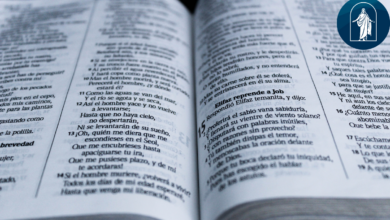What does Psalms mean? Concept and 5 frequently asked questions!
What does Psalms mean?? The Psalms are a significant part of the Old Testament of the Bible, known for their poetic words, music, and spiritual depth.
They are a collection of songs, prayers and hymns that have been a source of inspiration and solace for people of various religious traditions over the centuries.
Today, we will look at the meaning of the Psalms, answering common questions about their origin, content and spiritual impact. Read with us and find out What does Psalms mean?, let's go!
What does Psalms mean?
The word “Psalms” originates from the Greek term “psalmos”, which means “music accompanied by instruments”.
In the biblical context, the Psalms are a collection of 150 poems and songs, being a vital part of the Old Testament. They offer a rich expression of faith, hope, praise and worship of God.
The Psalms serve as a spiritual guide for believers, offering words of encouragement in times of difficulty and despair, as well as reasons for gratitude and celebration in times of joy.
In addition to their literal meaning, the Psalms have significant cultural and historical relevance. They reflect the traditions and spirituality of the people of Israel and, at the same time, provide valuable insights into human nature and the relationship with the divine.
The Psalms are also widely used in liturgical practices and religious ceremonies, demonstrating their continued importance in faith communities around the world.
Therefore, “Psalms” is not just a word; is an inexhaustible source of inspiration and spiritual reflection for people of different beliefs and backgrounds.
Common questions
1. Who wrote Psalms?
The Psalms were written by several authors, including King David, Asaph, the sons of Korah, Heman, Ethan, and Moses. David is traditionally credited as the author of most of the Psalms, approximately 73 of them.
However, the authorship of the Psalms is a complex issue and many experts believe that different authors contributed over time, reflecting the experiences and spirituality of the people of Israel.
2. How many Psalms did David write?
David, the legendary king of Israel and skilled composer, is traditionally credited with authoring approximately 73 of the Bible's 150 Psalms.
His musical talent and spiritual depth are evident in these compositions, which reflect a diverse range of human emotions, from joy and gratitude to repentance and supplication.
The Psalms written by David are loved for their authenticity and honesty, connecting deeply with those who face challenges and seek comfort in their faith.
David's significant contribution to the Psalms is a fundamental part of the spiritual richness found in this sacred book, making it a perennial source of inspiration and reflection for believers around the world.
3. What is the greatest Psalm in the Bible?
Psalm 119 is the longest Psalm in the Bible in terms of verses, containing 176 verses. This Psalm is a celebration of the Word of God and its importance in the life of the believer.
Each section of Psalm 119 begins with a letter of the Hebrew alphabet, making it a poetic masterpiece and a testament to the psalmist's devotion to God's law and commandments.
4. What is the most powerful Psalm?
The power of the Psalms lies in their ability to touch the human heart and express a wide range of emotions and experiences.
There is no specific Psalm considered the most powerful, as the effectiveness of a Psalm can vary from person to person depending on individual circumstances. Some believers consider Psalm 23 to be especially powerful because of its comfort and promise of God's constant presence.
5. What is the shortest Psalm in the Bible?
Psalm 117 is the shortest Psalm in the Bible, with just two verses. Despite its brevity, this Psalm is a powerful exhortation to all nations to praise the Lord for his mercy and eternal faithfulness.
Even in its simplicity, Psalm 117 conveys the universality of God's love and the call for all people to worship the Creator.
Conclusion
The Psalms are a valuable part of the Bible, offering spiritual guidance, comfort, and inspiration to millions of people around the world.
The diversity of themes, emotions, and experiences found in the Psalms makes them relevant to all stages of human life.
By reflecting on frequently asked questions related to the Psalms, we can appreciate the richness of this sacred book and its timeless ability to connect us with the divine. To the next!

